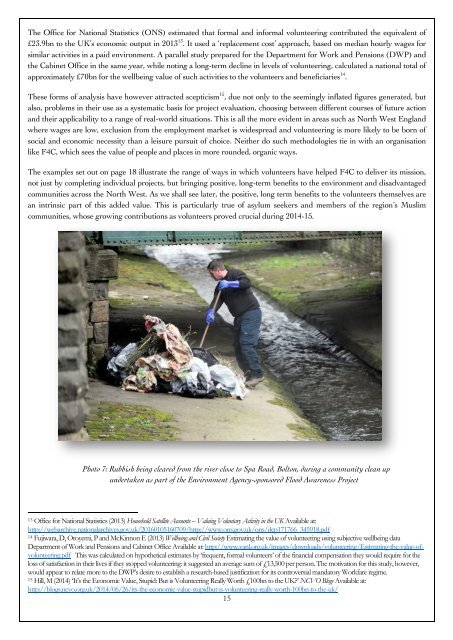Programme Evaluation 2014-15
Create successful ePaper yourself
Turn your PDF publications into a flip-book with our unique Google optimized e-Paper software.
The Office for National Statistics (ONS) estimated that formal and informal volunteering contributed the equivalent of<br />
£23.9bn to the UK’s economic output in 2013 13 . It used a ‘replacement cost’ approach, based on median hourly wages for<br />
similar activities in a paid environment. A parallel study prepared for the Department for Work and Pensions (DWP) and<br />
the Cabinet Office in the same year, while noting a long-term decline in levels of volunteering, calculated a national total of<br />
approximately £70bn for the wellbeing value of such activities to the volunteers and beneficiaries 14 .<br />
These forms of analysis have however attracted scepticism <strong>15</strong> , due not only to the seemingly inflated figures generated, but<br />
also, problems in their use as a systematic basis for project evaluation, choosing between different courses of future action<br />
and their applicability to a range of real-world situations. This is all the more evident in areas such as North West England<br />
where wages are low, exclusion from the employment market is widespread and volunteering is more likely to be born of<br />
social and economic necessity than a leisure pursuit of choice. Neither do such methodologies tie in with an organisation<br />
like F4C, which sees the value of people and places in more rounded, organic ways.<br />
The examples set out on page 18 illustrate the range of ways in which volunteers have helped F4C to deliver its mission,<br />
not just by completing individual projects, but bringing positive, long-term benefits to the environment and disadvantaged<br />
communities across the North West. As we shall see later, the positive, long term benefits to the volunteers themselves are<br />
an intrinsic part of this added value. This is particularly true of asylum seekers and members of the region’s Muslim<br />
communities, whose growing contributions as volunteers proved crucial during <strong>2014</strong>-<strong>15</strong>.<br />
Photo 7: Rubbish being cleared from the river close to Spa Road, Bolton, during a community clean up<br />
undertaken as part of the Environment Agency-sponsored Flood Awareness Project<br />
13 Office for National Statistics (2013) Household Satellite Accounts – Valuing Voluntary Activity in the UK Available at:<br />
http://webarchive.nationalarchives.gov.uk/20160105160709/http://www.ons.gov.uk/ons/dcp171766_345918.pdf<br />
14 Fujiwara, D, Oroyemi, P and McKinnon E (2013) Wellbeing and Civil Society Estimating the value of volunteering using subjective wellbeing data<br />
Department of Work and Pensions and Cabinet Office Available at: http://www.vanl.org.uk/images/downloads/volunteering/Estimating-the-value-ofvolunteering.pdf<br />
This was calculated on hypothetical estimates by ‘frequent, formal volunteers’ of the financial compensation they would require for the<br />
loss of satisfaction in their lives if they stopped volunteering: it suggested an average sum of £13,500 per person. The motivation for this study, however,<br />
would appear to relate more to the DWP’s desire to establish a research-based justification for its controversial mandatory Workfare regime.<br />
<strong>15</strong> Hill, M (<strong>2014</strong>) ‘It’s the Economic Value, Stupid: But is Volunteering Really Worth £100bn to the UK?’ NCVO Blogs Available at:<br />
http://blogs.ncvo.org.uk/<strong>2014</strong>/06/26/its-the-economic-value-stupidbut-is-volunteering-really-worth-100bn-to-the-uk/<br />
<strong>15</strong>


